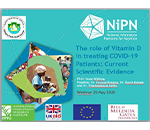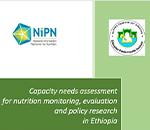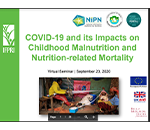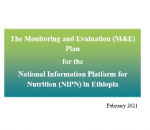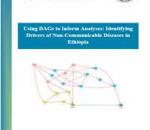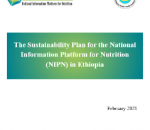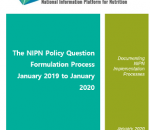PUBLICATION
Elements of a food systems approach are reflected in the NNP, NSA, Sequota, etc. however, to fully leverage this to inform
implementation, help adapt, and learn from process capacity building and research is needed
On May 29, 2020, we have hosted our second webinar on the role of Vitamin D in treating COVID-19 Patients: Current Scientific Evidence. The event included a presentation by Professor Susan J.
EPHI and IFPRI jointly conducted a NIPN Capacity Needs Assessment (NIPN CNA) to identify capacity needs and recommend strategies to strengthen capacities for nutrition monitoring, evaluation, policy research, data and knowledge sharing.
As part of the implementation of the NIPN operational cycle in Ethiopia, a set of priority policy questions were identified in 2019. Responses to most of these policy questions will be based on analysis of existing data, but a rapid literature review will help to refine the policy questions and provide useful information to guide the analysis.
The Ethiopian Public Health Institute (EPHI), IFPRI, NIPN and the Food Security Portal (FSP) Project co-hosted a webinar on 'COVID-19 and its impacts on childhood malnutrition and nutrition
This NIPN M&E Plan forms part of the implementation and project management of the NIPN. It describes the NIPN’s results framework, its intervention logic and theory of change, the M&E processes, the team, the data quality, and flow, data sources, collection, management, analysis, and reporting. It also provides an overview of the M&E matrix with indicators, targets, and means of verification.
To respond to one of the research questions (What are the drivers of NCDs i.e., overweight/obesity, hypertension, and diabetes in Ethiopia?), NIPN embarked on a new approach for data analysis. The approach uses causal path diagrams otherwise known as ‘directed acyclic graphs’ (DAGs) which have been constructed as part of the methodological framework underpinning the analysis.
This plan is prepared as a road map to guide the continuity of NIPN beyond the project period and ensure long-lasting impact in the nutrition sector. The specific objectives of the plan describe the NIPN’s interventions and specific actions which foster sustainability, the future plans for the sustained use of the NIPN and its services, and the NIPN’s fundraising plan to diversify its funding portfolio.
As part of the NIPN project cycle a policy question formulation (PQF) process takes place to help government ministries and the NIPN identify key nutrition policy questions which need to be answered to inform policy revisions, strategy development and program implementation. The initial PQF process was elaborate; it included literature reviews, interviews with key stakeholders and several consultative meetings.
This analysis mainly used nationally and regionally representative data sources to describe progress in the nutrition situation in Ethiopia since the start of the implementation of the second National Nutrition Program (NNP II). This evidence was generated to inform the finalization of the national Food and Nutrition Strategy.
Pagination
- Previous page
- Page 2
- Next page

